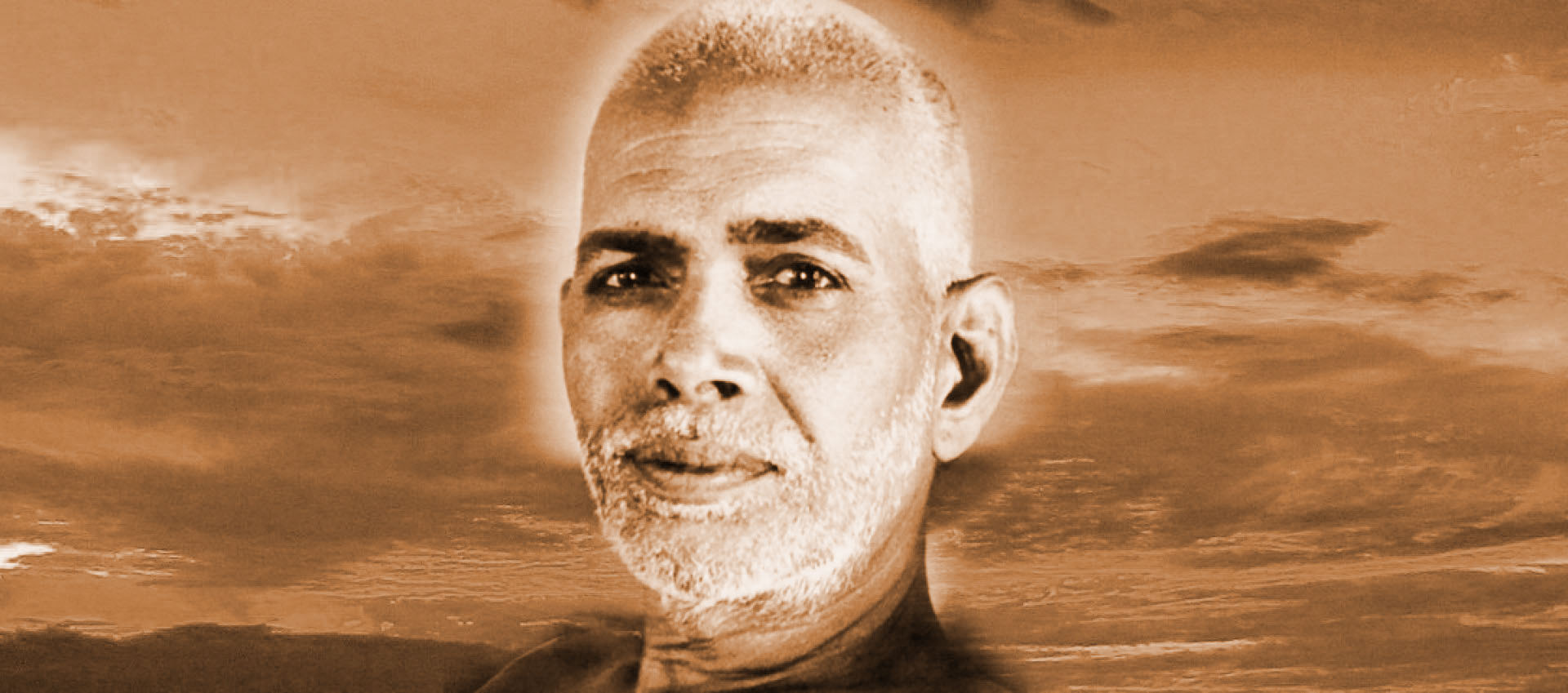
What is Meditation? How to do it? (2)
Extract from “Who Am I?”
~~~~~~~~
When the mind becomes quiet, the breath is controlled, and when the breath is controlled the mind becomes quiet…The exercise of breath-control is only an aid for rendering the mind quiet.
Like the practice of breath-control. meditation on the forms of God, repetition of mantras, restriction on food, etc., are but aids for rendering the mind quiet.
Through meditation on the forms of God and through repetition of mantras, the mind becomes one-pointed. The mind will always be wandering. Just as when a chain is given to an elephant to hold in its trunk it will go along grasping the chain and nothing else, so also when the mind is occupied with a name or form it will grasp that alone. When the mind expands in the form of countless thoughts, each thought becomes weak; but as thoughts get resolved the mind becomes one-pointed and strong; for such a mind Self-inquiry will become easy.
Of all the restrictive rules, that relating to the taking of “satvic” food, (good quality food that can enhance peace in the mind), in moderate quantities is the best; by observing this rule, the “satvic” quality of mind will increase, and that will be helpful for Self-inquiry.
~~~~~~~~
Extract from “Talks with Ramana Maharshi”
~~~~~~~~
Talk 52.
A visitor asked: “My mind remains clear for two or three days and turns dull for the next two or three days; and so it alternates. What is it due to?”
M.: It is quite natural; it is the play of brightness or goodness (satva), activity (rajas) and darkness or dullness (tamas) with these three alternating. Do not regret the dullness (tamas); but when brightness (satva) comes into play, hold on to it fast and make the best of it.
D.: What is dhyana (Meditation)?
M.: The word dhyana usually signifies meditation on some object, whereas nididhyasana (deep inner quest) is used for enquiry into the Self. The triads, waking, dream and sleep, persist until the Self is realised. Dhyana and Nididhyasana are the same so far as the aspirant is concerned, because they involve trinity and are synonymous with bhakti.
D.: How should dhyana be practised?
M.: Dhyana serves to concentrate the mind. The predominant idea keeps off all others. Dhyana varies according to the individual. It may be on an aspect of God, on a mantra, or on the Self, etc.
~~~~~~~~
Talk 462.
Lady D.: I fell ill. I could not meditate and so I felt depressed.
M.: This thought, ‘I am not able to concentrate,’ is itself an obstacle. Why should the thought arise?
D.: Can one remain without thoughts rising all the 24 hours of the day? Should I remain without meditation?
M.: What is ‘hours’ again? It is a concept. Each question of yours is prompted by a thought.
Your nature is Peace and Happiness. Thoughts are the obstacles to realisation. One’s meditation or concentration is meant to get rid of obstacles and not to gain the Self. Does anyone remain apart from the Self? No! The true nature of the Self is declared to be Peace. If the same peace is not found, the non-finding is only a thought which is alien to the Self. One practises meditation only to get rid of these alien fancies.
So, then, a thought must be quelled as soon as it rises. Whenever a thought arises, do not be carried away by it.
So the Self is not depressed; it is not imperfect: it is ever happy. The contrary feeling is a mere thought which has actually no stamina in it. Be rid of thoughts. Why should one attempt meditation? Being the Self one remains always realised, only be free from thoughts.
~~~~~~~~
Talk 398.
D.: Is concentration of mind one of the sadhanas (practices)?
M.: Concentration is not thinking one thing. It is, on the other hand, putting off all other thoughts which obstruct the vision of our true nature.
All our efforts are only directed to lifting the veil of ignorance. Now it appears difficult to quell the thoughts. In the regenerate state it will be found more difficult to call in thoughts. For are there things to think of? There is only the Self. Thoughts can function only if there are objects. But there are no objects. How can thoughts arise at all?
The habit makes us believe that it is difficult to cease thinking. If the error is found out, one would not be fool enough to exert oneself unnecessarily by way of thinking.
~~~~~~~~
Talk 91.
A visitor asked: How is the mind controlled?
M.: What do you call ‘the mind’?
D.: When I sit down to think of God, thoughts wander away to other objects. I want to control those thoughts.
M.: In the Bhagavad~Gita it is said that it is the nature of the mind to wander. One must bring one’s thoughts to bear on God. By long practice the mind is controlled and made steady.
The wavering of the mind is a weakness arising from the dissipation of its energy in the shape of thoughts. When one makes the mind stick to one thought the energy is conserved, and the mind becomes stronger.
D.: What is the meaning of the strength of the mind?
M.: Its ability to concentrate on one thought without being distracted.
D.: How is that achieved?
M.: By practice. A devotee concentrates on God; a seeker, follower of the jnana-marga, seeks the Self. The practice is equally difficult for both.
D.: Even if the mind is brought to bear on the search for the Self, after a long struggle the mind begins to elude him and the man is not aware of the mischief until after some time.
M.: So it would be. In the earlier stages the mind reverts to the search at long intervals; with continued practice it reverts at shorter intervals until finally it does not wander at all. It is then that the dormant sakti (power) manifests. The satvic pure mind is free from thoughts whereas the rajasic mind is full of them. The sattvic mind resolves itself into the Life-current.
~~~~~~~~
Talk 150.
Mrs. and Mr. Kelly, an elderly couple from America, and others of their company desired to know what they should do to gain concentration in face of discomforts.
M.: The discomforts will not worry you if your concentration is right. Do not mind the discomforts. Keep your mind steady in meditation. If you have not the strength and endurance to bear the discomforts, how do you hope to gain realization of the Self? Realization must be amidst all the turmoils of life. If you make yourself comfortable and go to bed you fall asleep. Face the troubles but keep yourself steady in meditation.
~~~~~~~~
Talk 152.
Mrs. Kelly desired to know how she should best learn to meditate.
Sri Bhagavan asked if she had made japa (rolling beads as Roman Catholics do). She said: “No”.
M.: Have you thought of God, His qualities, etc.?
D.: I have read, talked, etc. about such themes.
M.: Well, if the same be revolved in the mind without open expression through the senses it is meditation.
D.: I mean meditation as signified in “The Secret Path” and “Who am I?”
M.: Long for it intensely so that the mind melts in devotion. After the camphor burns away no residue is left. The mind is the camphor; when it has resolved itself into the Self without leaving even the slightest trace behind, it is Realization of the Self.

